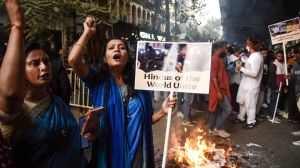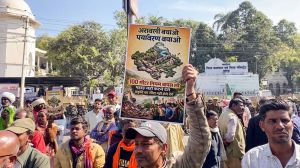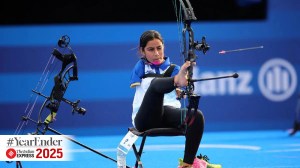Running while waiting
Indian diplomacy must press for quick, decisive actions from the international system

In his intervention in Thursday8217;s Parliament debate on the Mumbai aggression, Prime Minister Manmohan Singh outlined a three-pronged strategy to defeat the relentless terror originating from Pakistan. Speaking in the Lok Sabha, the prime minister called for a galvanisation of the international community in rooting out the sources of international terrorism in Pakistan; ruled out, at least for the moment, a military response, favouring persisting with diplomatic pressure on Islamabad; and promised a root and branch overhaul of the internal security system. Although it might be the only way going forward, the road ahead is full of potholes.
The most important element of the three-fold strategy is the reform of the internal security system that has utterly failed to address the terrorist challenge that has stared at the nation for so long. To the extent that the new home minister, P. Chidambaram, inspires a lot more confidence than his predecessor and has already outlined a number of steps to revamp the internal security structures, there are welcome signs of a new purposefulness in North Block.
But the tasks that confront Chidambaram are contradictory. On the one hand, his focus must necessarily be short term 8212; to prevent a follow-on attack after Mumbai that would destroy the nation8217;s political confidence in the government8217;s ability to protect citizens. On the other hand, in the few months that he has in hand, Chidambaram must also lay out an ambitious framework for a structural reform of India8217;s internal security apparatus. Even in the best of times that is a daunting task. But better late than never.
If security sector reform can generate results only over the longer term, India8217;s second element 8212; mobilisation of international pressure on Pakistan 8212; must necessarily be a short-term venture. After Mumbai, the international community has urged India to avoid a military escalation and promised to get Pakistan to act against the perpetrators of the Mumbai attacks.
There is no doubt that the international pressure 8212; from the US and the United Nations 8212; has begun to deliver a few results. The Pakistan government shut down the offices of the Jamaat-ud-Dawa, detained its leaders and put restrictions on others like Masood Azhar of the Jaish-e-Mohammad. Keeping its fingers crossed on the exact nature and consequences of these actions, India needs a lot more sustained and purposeful international action aimed at dismantling Pakistan8217;s expansive terror infrastructure.
But sooner than later, Mumbai will begin to fade from the list of international priorities as other inevitable crises intrude into the global agenda. Indian diplomacy must, therefore, press for quick and decisive actions from the international system.
Although it welcomes the current global support on Mumbai, India might soon discover that not all international attention will be helpful. Given the impending change of guard at the White House, American President-elect Barack Obama8217;s repeated references to a new 8220;integrated regional approach8221; to Afghanistan, Pakistan, Kashmir and India do raise concerns in New Delhi. Besides a potential change in US policy after President George W. Bush, sustained involvement of the UN Security Council is also likely to bring in other great powers, especially China, into the South Asian terror theatre. Although China has finally supported the sanctions against Jamaat-ud-Dawa after resisting them for long, New Delhi is unlikely to see Beijing8217;s future role in shaping the Indo-Pak dynamic in a positive light.
If international intervention is unpredictable in its consequences, the bilateral framework with Pakistan becomes all the more important for India. When all is said and done, India and Pakistan will finally have to sort things out between themselves. That brings us to the third and most complex element of Dr Singh8217;s three-pronged strategy: the search for definitive results from Pakistan on eliminating the sources of anti-India terror from its soil.
In the Lok Sabha, External Affairs Minister Pranab Mukherjee reaffirmed that India will not be 8220;provoked8221; into a knee-jerk military confrontation with Pakistan after Mumbai. The prime minister, however, cautioned the world not to mistake India8217;s restraint for weakness. Together they are signalling that India will not rule out other options if its current diplomatic effort fails to produce satisfactory results. Dr Singh and Mukherjee have also underlined India8217;s nuanced understanding of the complex civil-military relationship in Pakistan today. As Mukherjee told the Lok Sabha, India has 8220;no quarrel with the democratic government in Pakistan8221;. He, however, insisted that India cannot simply stand by if the democratic government across the border cannot deny its territory for unending aggression against India. Neither Dr Singh nor Mukherjee trashed the steps that Pakistan President Asif Ali Zardari has taken so far against the terror groups. While noting those actions, the prime minister simply demanded that they 8220;should be pursued, taken to their logical conclusion8221;. Mukherjee suggested that India is 8220;ready to help8221; if Pakistan8217;s civilian leadership can keep its promise to 8220;deny sanctuary8221; to the terror groups.
India can indeed assist Zardari if he can help himself and the democratisation of Pakistan by gaining full control of his country8217;s national security policy and redefine it in the long-term interests of the people of Pakistan. If Zardari is prepared the walk down that difficult road, India should be prepared to make it easier for him. But as Mukherjee reminded the nation, India does not have the power to transform Pakistan8217;s internal politics. It is up to the Pakistanis themselves.
India is right in waiting to see if Zardari can prevail over the terrorist groups and their benefactors in Pakistan8217;s security establishment. If he can8217;t, India will have to start walking up the first steps of an escalatory ladder. The post Mumbai pause, then, is a delicate moment that won8217;t last too long.
The writer is a professor at the S. Rajaratnam School of International Studies, Nanyang Technological University, Singapore
expressexpressindia.com
- 01
- 02
- 03
- 04
- 05































